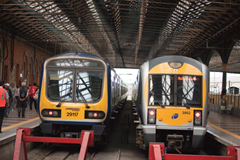Transport spending
 eolas overviews the transport sector in advance of capital spending decisions by the Government.
eolas overviews the transport sector in advance of capital spending decisions by the Government.
Since he became Transport Minister, Leo Varadkar has made it clear that the capital envelope available to transport (€1,700 million) will be reduced due to the requirement to decrease the country’s deficit by €5 billion by 2015, and to meet other EU-IMF spending criteria outlined in the Memorandum of Understanding. However, he has said that “this doesn’t mean we should spend nothing and stop all investment.”
A spokesman for the department explained that following the revised estimates in June, the gross capital figure for the department, including tourism and sport, is now €1,502 million. The table below shows the department’s capital spend up to 5 August 2011.
The Minister has said that decisions on which transport projects are to go ahead will be contained in a new National Development Plan for 2012-2018, to be finalised after the comprehensive review of capital expenditure.
The Greater Dublin Area Transport Strategy 2011-2030 had contained plans for major public transport rail projects such as Metro North, Metro West, Luas BXD, Luas F and the Dart underground. Varadkar has said: “I want to see all these projects go ahead.” But he has acknowledged that there is only likely to be enough money for one in the short term. An Irish Independent report on 6 August speculated that Metro North will not go ahead because property along the proposed route, bought by the Railway Procurement Agency for demolition, is now being rented out.
Another rail project prioritised by the last Government in its Infrastructure Priorities document – the Navan rail line – is “unlikely”, according to a letter from the head of the National Transport Authority to Navan County Council.
Consultation on the merger of the National Roads Authority (NRA) and the Railway Procurement Agency is under way. Varadkar has also announced the merger of Dundalk Port into Dublin Port and a ports policy review is underway.
The department allocated €75 million (not used by the NRA) to the Jobs Initiative; €60 million for the repair of regional and local roads that have been damaged by two severe winters; and €15 million for local transport projects such as refurbishing and updating railway stations, cycle lanes, pedestrian routes and park-and-ride facilities. However, Fianna Fáil leader Micháel Martin criticised the initiative saying that 70 per cent of the allocation for education, roads and retrofitting was actually taken from existing allocations.
The Minister has also decided to retain the €3 travel tax because the airlines had not indicated to him their willingness to restore capacity or launch new routes from Irish airports. He cited CSO first quarter visitor statistics which showed that outbound traffic by Irish residents fell by 11.7 per cent. This was disputed by Ryanair’s Michael O’Leary who criticised the Government for not accepting its offer to bring an additional 5 million passengers to Ireland over five years, on the condition that airport charges are dropped for those passengers.
The Government is planning to reinvest half of the €30 million revenue generated by travel tax each year to promote travel to Ireland. However, it will abolish the tax at any time if the airlines restore cancelled routes and increase passenger numbers.
Capital spend on transport 2011 (€m)
Roads: 347.6
Public transport: 72.6
Aviation: 1.7
Maritime: 0.88
Cross-border initiatives: 12.7
Total: 435.6
Source: Department of Transport, Tourism and Sport





